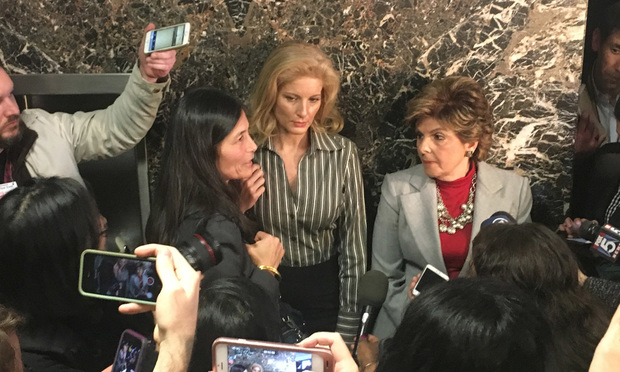Ex-'Apprentice' Contestant Argues She Needs Info on Other Trump Accusers in Defamation Suit
Summer Zervos, the former contestant, and her attorneys are asking Trump to produce information that would support his claims that each woman who accused him of sexual misconduct during the 2016 presidential campaign “lied when they came forward to hurt my campaign,” as he said.
October 05, 2018 at 12:41 PM
6 minute read
 Summer Zervos, center, with attorneys Mariann Meier Wang, left, and Gloria Allred, as they take questions from reporters following a December hearing in Zervos' defamation suit against President Donald Trump. Photo: Andrew Denney/NYLJ
Summer Zervos, center, with attorneys Mariann Meier Wang, left, and Gloria Allred, as they take questions from reporters following a December hearing in Zervos' defamation suit against President Donald Trump. Photo: Andrew Denney/NYLJ
Attorneys for a former “Apprentice” contestant who is suing President Donald Trump for defamation wrote in a new filing that information on the president's other accusers could shed light into his state of mind and intent when he allegedly lied about sexually assaulting her more than a decade ago.
Summer Zervos, the former contestant, and her attorneys are asking Trump to produce information that would support his claims that each woman who accused him of sexual misconduct during the 2016 presidential campaign “lied when they came forward to hurt my campaign,” as he said.
Zervos is represented by Mariann Meier Wang, a founding partner of Cuti Hecker Wang in Manhattan.
Trump is represented by Marc Kasowitz, a founding partner of Kasowitz Benson Torres. He did not immediately comment on the filing Friday.
The lawsuit is the result of public statements made by Trump against Zervos and his other accusers two years ago in which he said the women fabricated their stories. Zervos, specifically, alleged Trump kissed her on the lips when they met at Trump Tower. She also claimed Trump made unwanted advances toward her during a private meeting at the Beverly Hills Hotel, including kissing and touching.
Trump denied the allegations in a statement on his campaign website after Zervos spoke publicly about the claims in October 2016.
“To be clear, I never met her at a hotel or greeted her inappropriately a decade ago,” Trump said. “That is not who I am as a person, and it is not how I've conducted my life.”
Zervos wants to compel Trump's attorneys to produce information about his other accusers to prove the opposite. They argued that Trump's actions with Zervos are part of a larger pattern of how he has treated women in the past.
“In other words, where a party's state of mind is relevant, as it is here, evidence of his prior acts that bears on his intent or knowledge is admissible,” Wang wrote in the recent filing, which is a reply brief on their motion from August.
While the statement in October was directed at Zervos, Trump said during campaign events that his other accusers had made up their stories as well.
“Every woman lied when they came forward to hurt my campaign, total fabrication,” Trump said at a rally in 2016. “The events never happened. Never. All of these liars will be sued after the election is over.”
Those lawsuits have not come to fruition. Instead, Zervos filed her suit against Trump days before his inauguration in 2017. She claimed that her restaurant in California suffered after Trump publicly accused her of lying. She's seeking damages and has demanded that Trump retract his statements about her.
Her attorneys want to use his past public statements against him in the trial, which is why they want his attorneys to produce any documents they might have related to each accuser. The more Zervos and her attorneys can show Trump's statements were not justified by any tangible proof, the stronger their case could be against his claims about her account.
“The truth or falsity of defendant's statements about his other accusers plainly is probative of whether he intentionally made false statements about plaintiff, because if defendant consciously lied more than a dozen times when he spoke about other accusers, a jury could reasonably conclude that he intentionally lied when, during the same time period, he falsely denigrated plaintiff and denied assaulting her,” Wang wrote.
Trump's attorneys argued against the motion in a filing last month, calling it a “fishing expedition.” They said information on Trump's other accusers is not directly relevant to her lawsuit against the president.
“Plaintiff's fishing expedition is simply a masked attempt to obtain inadmissible propensity-related evidence that, if defendant maliciously made statements in the past (which he did not), then he did so in this case,” Kasowitz wrote. “Indeed, under New York law, plaintiff is not permitted to try to prove that defendant allegedly acted with malice in making the statements at issue here by reference to statements that do not defame her.”
Kasowitz also noted that virtually none of Trump's other accusers have brought similar legal actions against him since the election.
Trump's attorneys have also argued that the U.S. Supreme Court decision in Clinton v. Jones prevents Trump from being sued in state court, and subsequently undermines their motion to compel the president to produce information on his other accusers.
Wang wrote in her filing that Trump's attorneys have ignored a decision by the trial court in that case that she argued supports their motion.
“Indeed, in continuing to rely upon Clinton v. Jones, defendant ignores that the trial court in that case granted motions to compel requiring President Clinton to respond to interrogatories regarding his sexual activities with other women and allowing the plaintiff to depose non-parties about their sexual activities with President Clinton,” Wang wrote.
Trump's attorneys made the same argument earlier this year before Manhattan Supreme Court Justice Jennifer Schecter, who said in a decision that Trump is decidedly not immune from the lawsuit. The Court of Appeals also decided not to hear Trump's appeal to grant a stay in the case.
Trump's attorneys are hoping an appellate court reverses Schecter's ruling. The parties agreed last month to a stipulation that provides for Trump to give written answers to deposition questions.
The parties are expected to meet later this month with Schecter for a conference on compliance by Trump and his attorneys in the lawsuit.
READ MORE:
Trump Pushes Back on Ex-'Apprentice' Contestant's Effort to Get Info About More Accusers
NY Court of Appeals Denies Trump Stay in Defamation Suit by Ex-'Apprentice' Contestant
Trump Lawyers Argue That Discussions About Sexual Misconduct Should Not Be Released
This content has been archived. It is available through our partners, LexisNexis® and Bloomberg Law.
To view this content, please continue to their sites.
Not a Lexis Subscriber?
Subscribe Now
Not a Bloomberg Law Subscriber?
Subscribe Now
NOT FOR REPRINT
© 2025 ALM Global, LLC, All Rights Reserved. Request academic re-use from www.copyright.com. All other uses, submit a request to [email protected]. For more information visit Asset & Logo Licensing.
You Might Like
View All

Family Law Practitioners Weigh In on Court System's New Joint Divorce Program

Former NY City Hall Official Tied to Adams Corruption Probe to Plead Guilty

New Charges Expected in Sex Trafficking Case Against Broker Brothers
Trending Stories
- 1ACC CLO Survey Waves Warning Flags for Boards
- 2States Accuse Trump of Thwarting Court's Funding Restoration Order
- 3Microsoft Becomes Latest Tech Company to Face Claims of Stealing Marketing Commissions From Influencers
- 4Coral Gables Attorney Busted for Stalking Lawyer
- 5Trump's DOJ Delays Releasing Jan. 6 FBI Agents List Under Consent Order
Who Got The Work
J. Brugh Lower of Gibbons has entered an appearance for industrial equipment supplier Devco Corporation in a pending trademark infringement lawsuit. The suit, accusing the defendant of selling knock-off Graco products, was filed Dec. 18 in New Jersey District Court by Rivkin Radler on behalf of Graco Inc. and Graco Minnesota. The case, assigned to U.S. District Judge Zahid N. Quraishi, is 3:24-cv-11294, Graco Inc. et al v. Devco Corporation.
Who Got The Work
Rebecca Maller-Stein and Kent A. Yalowitz of Arnold & Porter Kaye Scholer have entered their appearances for Hanaco Venture Capital and its executives, Lior Prosor and David Frankel, in a pending securities lawsuit. The action, filed on Dec. 24 in New York Southern District Court by Zell, Aron & Co. on behalf of Goldeneye Advisors, accuses the defendants of negligently and fraudulently managing the plaintiff's $1 million investment. The case, assigned to U.S. District Judge Vernon S. Broderick, is 1:24-cv-09918, Goldeneye Advisors, LLC v. Hanaco Venture Capital, Ltd. et al.
Who Got The Work
Attorneys from A&O Shearman has stepped in as defense counsel for Toronto-Dominion Bank and other defendants in a pending securities class action. The suit, filed Dec. 11 in New York Southern District Court by Bleichmar Fonti & Auld, accuses the defendants of concealing the bank's 'pervasive' deficiencies in regards to its compliance with the Bank Secrecy Act and the quality of its anti-money laundering controls. The case, assigned to U.S. District Judge Arun Subramanian, is 1:24-cv-09445, Gonzalez v. The Toronto-Dominion Bank et al.
Who Got The Work
Crown Castle International, a Pennsylvania company providing shared communications infrastructure, has turned to Luke D. Wolf of Gordon Rees Scully Mansukhani to fend off a pending breach-of-contract lawsuit. The court action, filed Nov. 25 in Michigan Eastern District Court by Hooper Hathaway PC on behalf of The Town Residences LLC, accuses Crown Castle of failing to transfer approximately $30,000 in utility payments from T-Mobile in breach of a roof-top lease and assignment agreement. The case, assigned to U.S. District Judge Susan K. Declercq, is 2:24-cv-13131, The Town Residences LLC v. T-Mobile US, Inc. et al.
Who Got The Work
Wilfred P. Coronato and Daniel M. Schwartz of McCarter & English have stepped in as defense counsel to Electrolux Home Products Inc. in a pending product liability lawsuit. The court action, filed Nov. 26 in New York Eastern District Court by Poulos Lopiccolo PC and Nagel Rice LLP on behalf of David Stern, alleges that the defendant's refrigerators’ drawers and shelving repeatedly break and fall apart within months after purchase. The case, assigned to U.S. District Judge Joan M. Azrack, is 2:24-cv-08204, Stern v. Electrolux Home Products, Inc.
Featured Firms
Law Offices of Gary Martin Hays & Associates, P.C.
(470) 294-1674
Law Offices of Mark E. Salomone
(857) 444-6468
Smith & Hassler
(713) 739-1250






